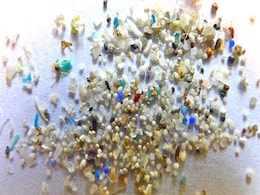Nanoplastics In Brain
- All
- News
-

Nanoplastics From Plastic Bottles Can Definitely Harm Your Body, Proves Indian Study
- Thursday December 4, 2025
- Health | Indo-Asian News Service
Nanoplastics derived from single-use PET bottles can directly disrupt key biological systems that are vital for human health, according to a study led by the Institute of Nano Science and Technology, Mohali (INST).
-
 www.ndtv.com
www.ndtv.com
-

Microplastics In Mind: Scientists Discover Plastic Particles In Human Brains
- Friday August 1, 2025
- Feature | Agence France-Presse
Tiny shards of plastic called microplastics have been detected accumulating in human brains, but there is not yet enough evidence to say whether this is doing us harm, experts have said.
-
 www.ndtv.com
www.ndtv.com
-

Human Brains Contain A Spoon's Worth Of Nanoplastics, New Study Suggests
- Friday February 7, 2025
- Science | Edited by Bhavya Sukheja
The human brain may contain an entire spoon's worth of nanoplastics, according to new findings published in the journal Nature Medicine.
-
 www.ndtv.com
www.ndtv.com
-

Microplastics Found in Human Brain Tissue, Study Shows Rising Levels
- Friday February 7, 2025
- Written by Gadgets 360 Staff
A study has detected microplastics and nanoplastics in human brain tissue, showing a 50 percent increase in levels over recent years. The findings suggest these particles may bypass the blood-brain barrier, leading to concerns over potential health effects. Experts are now focusing on how these plastics enter the brain and their possible role in ne...
-
 www.gadgets360.com
www.gadgets360.com
-

Nanoplastics From Plastic Bottles Can Definitely Harm Your Body, Proves Indian Study
- Thursday December 4, 2025
- Health | Indo-Asian News Service
Nanoplastics derived from single-use PET bottles can directly disrupt key biological systems that are vital for human health, according to a study led by the Institute of Nano Science and Technology, Mohali (INST).
-
 www.ndtv.com
www.ndtv.com
-

Microplastics In Mind: Scientists Discover Plastic Particles In Human Brains
- Friday August 1, 2025
- Feature | Agence France-Presse
Tiny shards of plastic called microplastics have been detected accumulating in human brains, but there is not yet enough evidence to say whether this is doing us harm, experts have said.
-
 www.ndtv.com
www.ndtv.com
-

Human Brains Contain A Spoon's Worth Of Nanoplastics, New Study Suggests
- Friday February 7, 2025
- Science | Edited by Bhavya Sukheja
The human brain may contain an entire spoon's worth of nanoplastics, according to new findings published in the journal Nature Medicine.
-
 www.ndtv.com
www.ndtv.com
-

Microplastics Found in Human Brain Tissue, Study Shows Rising Levels
- Friday February 7, 2025
- Written by Gadgets 360 Staff
A study has detected microplastics and nanoplastics in human brain tissue, showing a 50 percent increase in levels over recent years. The findings suggest these particles may bypass the blood-brain barrier, leading to concerns over potential health effects. Experts are now focusing on how these plastics enter the brain and their possible role in ne...
-
 www.gadgets360.com
www.gadgets360.com






